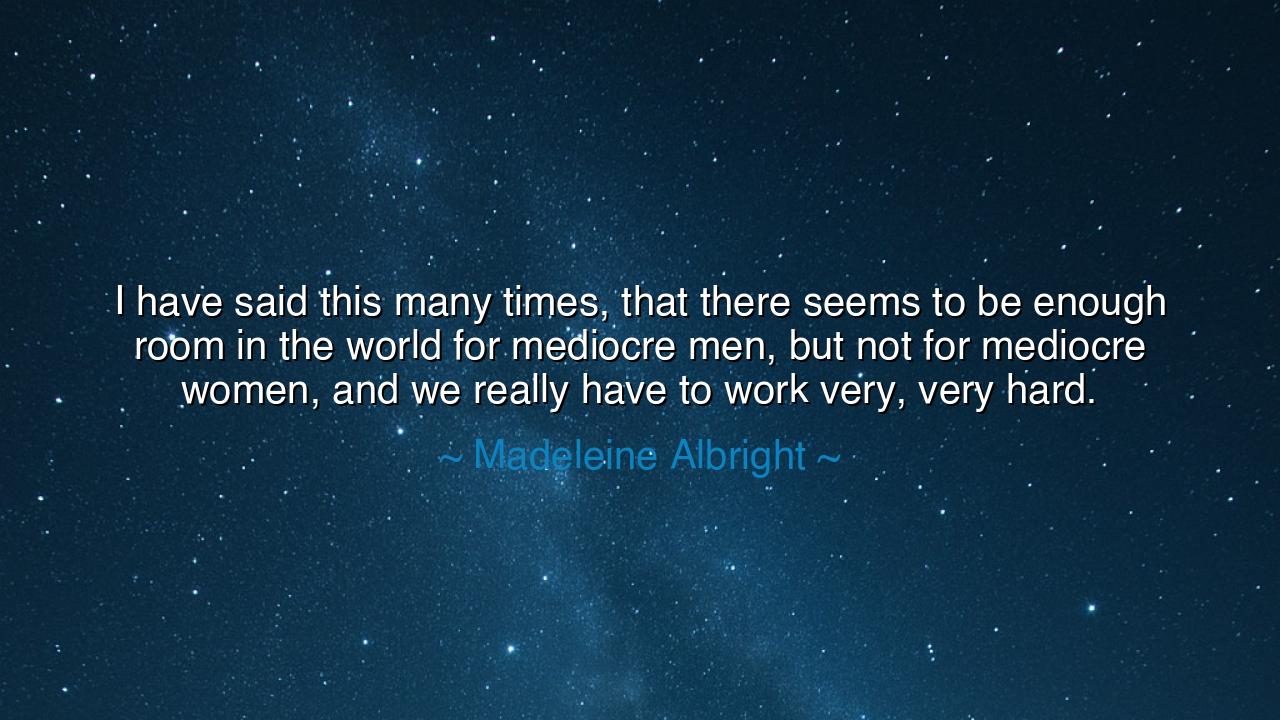
I have said this many times, that there seems to be enough room
I have said this many times, that there seems to be enough room in the world for mediocre men, but not for mediocre women, and we really have to work very, very hard.






Listen to the powerful words of Madeleine Albright, a woman who rose to the highest ranks of political leadership and, through her words, seeks to awaken the spirit of determination in all who strive against the odds: “I have said this many times, that there seems to be enough room in the world for mediocre men, but not for mediocre women, and we really have to work very, very hard.” These words speak not only to the realities of gender inequality but to the heavy burden placed upon women to prove themselves worthy of the same recognition, opportunities, and space that men often take for granted. In these few lines, Albright encapsulates a profound truth—that women, far more than men, must overcome barriers of expectation, perception, and prejudice in order to succeed.
From the ancient world, we see that the struggle for recognition was not just a battle for equality but a battle for identity. The great warrior queens of history, such as Cleopatra of Egypt or Artemisia of Halicarnassus, faced immense resistance in a world dominated by male rulers and conquerors. Yet, they did not sit idle in the face of this challenge. Cleopatra, with her intelligence and political savvy, carved a place for herself as a ruler, negotiating with the most powerful men of her time—Julius Caesar and Mark Antony. Artemisia, who led her fleet in the Persian wars, was revered not only for her strategic mind but for her ability to command respect in a world that viewed women as subjects rather than sovereigns. These women did not settle for mediocrity—they fought against the overwhelming forces of history that sought to deny them their power.
Just as these ancient queens had to work harder than their male counterparts to prove their worth, so too does Albright’s statement echo in the lives of women today. Mediocrity, for a woman, is not a comfortable position. It is a luxury afforded to few. Men, on the other hand, often find that their mediocrity is tolerated, even expected, as a baseline. Society is more forgiving when men fail or fall short. But for women, the bar is higher. The standards are greater. Mediocrity is not tolerated; they must achieve excellence or face obscurity. This truth is woven throughout history, where women in many fields—be it politics, the arts, or science—had to prove not only their intelligence and competence but their right to exist in spaces where men had long reigned supreme.
Consider the remarkable example of Marie Curie, the first woman to win a Nobel Prize and the only person to win Nobel Prizes in two different scientific fields—Physics and Chemistry. Curie’s achievements were not simply groundbreaking—they were revolutionary in a time when the very idea of women excelling in the sciences was met with scorn and doubt. She faced insurmountable obstacles, not because of a lack of ability, but because of her gender. She had to work harder than her male counterparts, not only to prove her brilliance but to show that she belonged at the table of the world’s greatest minds. Curie’s legacy is a testament to what a woman can achieve when she is forced to surpass the expectations set before her, when mediocrity is not an option, and excellence becomes the only path forward.
The lesson that Madeleine Albright imparts with her words is one of profound resilience. She does not lament the difficulty but calls for action. The world does not offer equal opportunities; it is often more demanding of women than it is of men. And yet, it is in this very struggle that women find their greatest strength. Excellence, then, is not just a goal, it is a necessity for survival. Women who seek to rise in a world that constantly tests their worth must work harder than anyone else. But in this, there is power—the power of self-definition, the power of proving that the bar can and will be set higher, not just for one woman, but for all who follow.
In your own life, reflect on how you approach the challenges before you. The world often sets higher expectations for you, just as it does for women in history. But instead of being discouraged by the pressure, let it fuel you. Do not accept mediocrity, whether it is imposed by society or by your own limitations. Just as Cleopatra, Artemisia, and Marie Curie did before you, push against the boundaries that others try to set for you. Rise above them with the conviction that your excellence is not only possible, but necessary. Know that your work will speak louder than any doubt, and in your determination, you will find the path to greatness.
Thus, I urge you, dear listener, to embrace the truth in Albright’s words. Work hard, not because the world demands it, but because you have the power to transform it. Rise above the obstacles and the barriers that stand before you. In your striving, you create not only the life you wish to live, but you also pave the way for those who will come after you. Your journey is not just about personal success, but about shattering the limits placed on you, and showing the world that mediocrity is no longer an option. Instead, like the great women of history, you will forge a path of excellence, a path where your greatness can no longer be denied.






AAdministratorAdministrator
Welcome, honored guests. Please leave a comment, we will respond soon